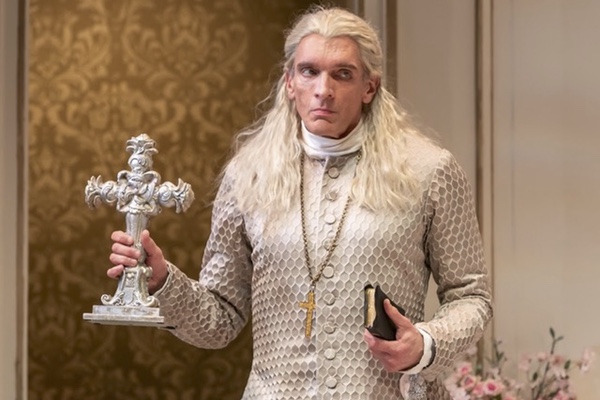Mom, Dad and the Rogue Boyfriend in 1660s France

What girl in America today has not had her parents try to get her to boot her boyfriend, who she loves and they hate, and marry the guy they adore, who is so perfect in every way?
What teenage girl in America today is bound and determined not to do whatever her parents want of her?
That’s the story told by Moliere in his classic French comedy, Tartuffe, that just opened in a joyful production at the Shakespeare Theater of New Jersey at Drew University, in Madison, New Jersey.
The chief character, bold and brazen Tartuffe, is a pious religious hypocrite who uses his love of God to grab fortunes from old men and seduce women. Tartuffe, a well-dressed vagrant, comes into the life of wealthy Frenchman Orgon at the time that his daughter, Mariane, is about to marry her beau, Valere, whom she loves deeply. Tartuffe wraps Orgon, in a bit of a mid-life crisis, around his finger and convinces Orgon to give him his house, money and, best of all, shove Valere to the side and let the glib, but sleazy, Tartuffe marry his daughter. Orgon’s wife, Elmire, sees right through the knave and tries to convince her husband that his intentions are questionable. She is really annoyed when Tartuffe tries to seduce her while at the same time claiming the hand of her daughter. While all of this is going on, Orgon, in a rage, disinherits his anti-Tartuffe son, Damis. The story covers how the family argues against Tartuffe while the father champions him. Will Tartuffe succeed in his plot or will the good people on Orgon’s household convince him, to realize the truth?
Does this sound just like an American soap opera? It does, and the strength of the play is that it brings life in the scandalous 17th century into 2018 America, where it fits rather well.
The play, adapted for the stage and translated into English by Richard Wilbur, is remarkably good for several reasons. First, playwright Moliere (real name Jean Baptiste Poquelin), who finished the play in 1664, wrote just about all of it in verse. If you listen closely you can hear the verse, but if you don’t it just sounds like any other well written play. It’s hard to write like that and write like that well. Second, the direction by Bonnie J. Monte is flawless. Actors race about the stage on a charming two-story palatial mansion, are dragged across the floor and ooh and ah at the battle between the wife and Tartuffe. It is a two hour and fifteen-minute play that flies by like ten minutes. Third, Monte gets tremendous acting from her cast, particularly Patrick Toon as the Dad, the flustered Orgon, and Brent Harris as the irascible, cagey Tartuffe, who, chin up, struts across the stage from the moment he steps on to it until the end of the play. Orgon is every dumb dad you ever met, taken in by a scoundrel and Tartuffe is every con man and swindler who ever existed. They are surrounded by a family of hyper people, all aghast at how the Dad was flimflammed by the slick Tartuffe. Also giving memorable performances are Caroline Kinsolving as wife Elmire, Sarah Nicole Deaver as bride-to-be Mariane, Aaron McDaniel as son Damis and Mark Hawkins as boyfriend Valere.
The highlight of the play is a tricky scene in which wife Elmire insists that Orgon hide under a dining room table in order to listen to Tartuffe as he, with Elmire’s wily urging, tries to seduce her. Her cue for the husband to come out from under the table are her knocks on it. She keeps banging on it, but the bumbling man of the house mixes up the cues and well, it is hilarious. The scene, staged perfectly, proves Tartuffe’s villainy to Orgon, who had seen him through rose-colored glasses. It is an uproarious moment that reminds you of the old Marx brothers movies.
The one drawback to this otherwise enchanting comedy is that Moliere did not put in some French history from that era or emphasize how much religion played in people’s lives. Orgon and his family seem to live alone with no ties to the French world. That’s a shame. The play was first produced just after Louis XIV, the legendary “Sun King” who reigned for decades, first assumed the throne. He helped to complete the gaudy palace of Versailles and made dozens of nobles live there. He also gathered dozens of philosophers and writers, including Moliere, around him. Louis worked hard to end French feudalism and centralized the government and was successful (the French revolution came more than 100 years later). Some discussion of that would have enhanced the play and added a lot of vivid color to it.
Even so, Tartuffe is a delightful romp through the castles and the rich of 17th century France with a lot thievery, deceit, debauchery, misplaced love, loud shouting matches and high-end misconduct. How could you not love it?
PRODUCTION: The play is produced by the Shakespeare Theater of New Jersey. Scenic Design: Brittany Vasta, Costumes: Nikki Delhomme, Lighting: Michael J. Weisgable, Sound: Bonnie J. Monte. The play is directed by Ms. Monte.It runs through June 10.